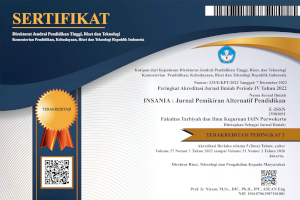KONSEPSI ETIKA DAN MORAL PENDIDIK DALAM PANDANGAN AL-GHAZALI “DI MUKA CERMIN†JURGEN HABERMAS
DOI:
https://doi.org/10.24090/insania.v17i2.1499Abstract
Abstract : Mystical ethics established by Al-Ghazali did not distinguish between good-bad and right-wrong. He put it together in a concept of morality or Akhlak. He stated that the source of all goodness and righteousness is not the reason (rational) nor the public, but the revelation of Allah (al-Qur’an). While Habermas explicitly separates good concept and the concept of justice. For him, the question of the goodness is the subjective preferences concerning the ethics/personal choice (regarding the good according to religion, tradition, and certain belief) that is evaluative. While justice is the moral that is universally normative (human rights concerns as a human being). Achievement of universal justice in the midst of a variety of matters kindness (pluralistic) is within a theory of discourse ethics to achieve the universal consensual justice in a democratic society. Key Words: Etich, Teacher, Morality, al-Ghazali, Jurgen Habermas.Downloads
Downloads
Published
How to Cite
Issue
Section
License
Authors who publish with this journal agree to the following terms:
Authors retain copyright and grant the journal right of first publication with the work simultaneously licensed under a Creative CommonsAttribution-ShareAlike License that allows others to share the work with an acknowledgment of the work's authorship and initial publication in this journal.
Authors are able to enter into separate, additional contractual arrangements for the non-exclusive distribution of the journal's published version of the work (e.g., post it to an institutional repository or publish it in a book), with an acknowledgment of its initial publication in this journal.
Authors are permitted and encouraged to post their work online (e.g., in institutional repositories or on their website) prior to and during the submission process, as it can lead to productive exchanges, as well as earlier and greater citation of published work (See The Effect of Open Access).








